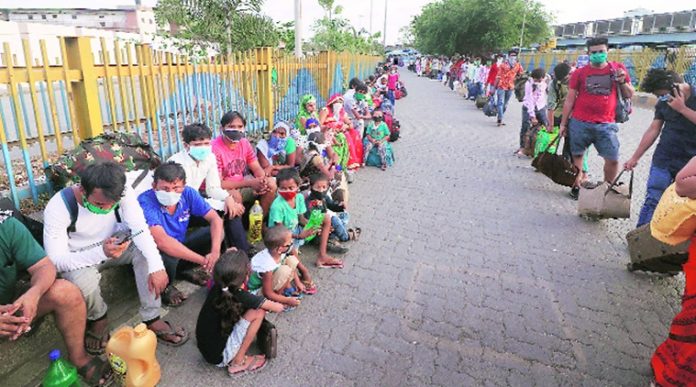This article is authored by Samaradhi Pandey. The following article talks about the plight of migrant workers during the lockdown and what the legal fraternity could do to help them.
Table of Contents
Introduction
India, a rapidly urbanizing country has witnessed the largest fleet of workers since the force of Lockdown in the country due to the pandemic COVID-19. The reason for imposing the lockdown has been clearly stated as preventing the collection of large groups at any place, workplace, markets, stadiums, parks, etc. The prohibition was important to prevent a large number of people from gathering or getting affected by the virus. Health facilities in a developing country such as ours are still to take steps to improvise with providing treatment at a minimum amount. On one hand, success has been observed of this lockdown, on the other hand, contrary view has also been observed which still is unaddressed and the ineffective ways of dealing with it are creating major problems.
The contrary view brings light to a large number of cases of internal migration within the country. The Inter-State Migrant Workmen Act, 1979 defines an inter-state migrant workmen/ labour as “any person who is recruited by or through a contractor in any state under an agreement or other arrangement for employment in an establishment in another state, whether with or without the knowledge of the principal employer of such establishment.”[i] But in changing scenario the term has widened its scope meaning, a paper dictates the phenomena as “those people who belong to Lower Income Group and move from their state of origin to another state, within the boundaries of India, in search of jobs which give them high wages, better quality of life, better facilities & other push & pull factors that contribute to the reasons of their migration’. Since they are in continuous movement they are called a floating population.”[ii]As to understand better the floating population are the workmen and labourers who are amidst the nationwide lockdown are moving along the cities either in search of transport or on foot, travelling distances of hundred kilometers to reach their destination, their origin city, town or village.

Reasons and challenges
The main reason for migration is almost the same in a number of cases, which are insufficient opportunities in their rural areas through which they are unable to secure meaningful livelihood for themselves or their families. Among many issues the two issues which resemble in all the conditions are:
- Push and Pull Factor: The low daily wages, lack of job opportunities, water scarcity, family problems, migration of spouses etc. While the pull factors in cities or urban areas are high wages, immense job opportunities, access to basic amenities & water, comfort & convenience, high quality of life. The promise of better wages and life attract the migrant for which they leave their origin source and trace long ways from home. They play an unpredictable gamble and witness for themselves how life unfolds for them.
- Socio-economic Conditions: Economic conditions are not alone to be blamed as the reason for migration. The reasons can be entirely social as well. To safeguard one or their upcoming generation from the hands of a rigid system as casteism, religion or hierarchy such steps also follow. Due to social standing it becomes difficult for people to secure a permanent source of employment which becomes a contributing factor in the causes to migrate.
It has been found that the age group between 16 and 40 is more inclined towards the urban areas for it promises better job opportunities and standard of living. Where the migration seems to be pleasant and promising, on the other hand it invites hardships and distress to the workmen for most basic things leading them to continue as an economically weaker society. Some of the issues are enlisted as follows:
- Recruitment stage problems: It has been observed that the migrants find it difficult to sustain permanent jobs. Most of them are employed by contractors on construction sites where the workload is heavy and payment is minimal. Generally, the seasonal migrants dominate low-paying jobs in which they adjust their meals, shelter and livelihood. For some of them when balancing among these becomes impossible, they tend to leave shelter first and try to sustain among many others of such kinds. The problem occurs due to the fact that most of them are unskilled or semi-skilled labourers, which makes it difficult for the contractors to place them.
- Poor access to Health Services: Since they cannot afford private hospitals, they often go back to their villages once they fall sick. This affects their employment opportunities, as well as the loss of wages. A large number of migrants find work as unskilled labourers since they enter the job market at a very early age, experience no upward mobility and remain stuck in the most unskilled, poorly paid and hazardous jobs for their whole work-life span.[iii]
- Hazardous jobs: Hazardous and informal market jobs in key sectors in urban destinations, such as construction, hotel, textile, manufacturing, transportation, services, domestic work etc.[iv] Dangers to limb or life can be seen in the types of jobs they do, and it provides them absolutely no benefit whatsoever, which further becomes a cause of distress for them.
- No social protection: Due to mobility and improper documentations, or lack of documents including basic documents such as ration cards or birth certificates in some cases creates issues of verification due to which enrollment in trade unions becomes difficult. Besides the contractors do not hire workers who are already part of trade unions providing a sense of prohibition of trade unions in others. The lockdown has also exposed the lack of a safety net for migrant workers. For instance, many construction workers found that they were not eligible to receive funds under the Building and Other Construction Workers’ Welfare Fund.[v]
- Ignored by political class: Since these workers are outsiders to the constituency or to the area, their interest is not taken in consideration by the local representatives or leaders. The rights or entitlement of migrant workers have successfully made its way on papers only and no practical positions in reality. Political classes ignore their existence causing deliberate disparities on the basis of language and region and create resentment from local workers. To illustrate, we see that in these times of pandemic, when a number of labourers return from their destination source to their origin source the local governments at first did not make any arrangements, neither for transportation nor for food and shelter.
- Emergency Situations: In crisis like the ones we face today, it becomes difficult to manage the vulnerable nature of migrants. Since the sudden lockdown of the country they found themselves without work. And due their illegibility there is no guarantee for their basic amenities such as water and food. In between the battle against the virus, they find themselves leaving with a handful of things out of whatever they might have earned or stored. Breaking the most basic reason of lockdown, marching towards their destination in large numbers, facing and creating problems. Although several steps have been taken since then to help the migrants escape these unfortunate conditions and to ease their ways if reaching home. But a large population is to be dealt, with proper cautions and prevention of further steps. One cannot possibly remain positive during these times and take steps which are unfortunate, the news of such instances are witnessed by us every day for many days.
- Hardships of distressed return workers: the workers fortunate enough to return to their native places are facing hardships because of no employment opportunities and source of income. The picture of their native place remains the same, and even though changes are there, employment opportunities belong to those who remained in the area instead of moving away. Moreover, the scenario becomes worse when certain State Governments like Uttar Pradesh, Madhya Pradesh, Karnataka, Gujrat, Rajasthan, Punjab and Odisha have sharpened their labour laws in order to welcome more companies in the area. The largest change can be observed in Uttar Pradesh, where the largest number of workers migrate, Labor Laws have been suspended for next three years for attracting factories and making the migrants stay in their native place. This might invite the factories but creates distress among the labourers for low wage employment and deplorable working conditions.
How can Lawyers help them?
The power of law is binding on everyone. To put an end to the atrocities of the rich and influenced in the upcoming times, lawyers will have to battle with the system making the widest interpretation of the laws possible. To look into the suspension of Labour Laws from the states which supply most of the migrant labourers, they have to keep a check that the factories or contractors hiring the workers do not commit fraud or misrepresentation with them. The vulnerable times ahead will observe the persons on the side of truth. Since it has been listed that people generally migrate from UP, Bihar, Punjab, Rajasthan, Uttarakhand to the lands of Delhi, Maharashtra, Tamil Nadu, Gujarat and Kerala, the lawyers of these particular states should be more ready for actions for defending the workers through different ways such as:
PIL: This is an effective way of addressing a number of issues at once and through the high authorities in the country such as the High Courts and Supreme Courts. Such steps will create irrevocable order which will ensure justice to the utmost level.
Mediation: Lawyers can act as a mediator between the contractors and workmen to ensure that exploitation of workmen do not take place and also to ensure that the disparity between the wages of male and female workers are not discriminated against. Lawyers can also ensure that the contractors do not hire children below 14 years.
Legal education and Counseling: The most effective way to prevent the exploitation of workmen is to provide them legal education. Educate them about their rights and powers. They can also provide effective counselling.
Set-up Trade Unions: Trade unions need strong leaders who support their cause and understand about the rights and powers. Lawyers, by establishing trade unions can lead the workmen in right direction understanding the obligations and powers of the workmen and also negotiate on the matters deemed necessary. It will also build a sense of relief among the workers that even in their native place, there is a hope for them to survive.
Legal aid campaigns: In the times ahead, the lawyers who want to help can also open two to three legal aid camps informing the workmen about their powers and different manners in which they can be exploited by the contractors and employers.
Persuade government through actions: Lawyers have a web of influenced people. They can also with an action plan, persuade the government to view the sides of these migrants and influence the government for their cause.
Recently, it has been observed in the corporate sector that in view of lay off female employees are laid off first than male employees. This can be called injustice but action is yet to be taken upon it. A Lawyer can observe this and set up a forum to help such laid off females helping them to find justice. It has to be kept in view that to achieve such a cause materialistic things and money should not be taken into account for it ensures best of the workmen.
References
[i] https://www.ijser.org/researchpaper/A-study-on-issues-of-inter-state-migrant-labourers-in-India.pdf
[ii] https://www.ijser.org/researchpaper/A-study-on-issues-of-inter-state-migrant-labourers-in-India.pdf
[iii] https://www.weforum.org/agenda/2017/10/india-has-139-million-internal-migrants-we-must-not-forget-them/
[iv] https://www.weforum.org/agenda/2017/10/india-has-139-million-internal-migrants-we-must-not-forget-them/
[v] https://www.thehindu.com/news/national/india-coronavirus-lockdown-migrant-workers-and-their-long-march-to-uncertainty/article31251952.ece
LawSikho has created a telegram group for exchanging legal knowledge, referrals and various opportunities. You can click on this link and join:
 Serato DJ Crack 2025Serato DJ PRO Crack
Serato DJ Crack 2025Serato DJ PRO Crack










 Allow notifications
Allow notifications


